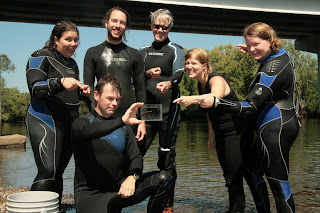Freshwater is the most precious resource on our planet. Though approximately 75% of the Earth is
covered in water, only 3% of that is freshwater. Less than 1% of that is accessible to humans;
the rest is either frozen, underground, or otherwise out or reach. When you think about it, that’s not much
water to share between 7 billion people and all the animals that call our
rivers, streams, and lakes home. In
order to ensure there is enough clean water to go around, we need to be good
stewards of our watershed.
 |
What is a watershed? It is an area of land where all the water within
it drains to the same place. Watersheds
can vary in size, and there can be watersheds within watersheds. For example, a drop of water from a rainstorm
may hit the ground in the watershed of a smaller river, like the Conasauga. That water in the Conasauga watershed runs
into the Coosa River, making it part of the Coosa
Watershed. The Coosa then flows into the Alabama River, which ultimately
flows into Mobile Bay. These watersheds
are all connected, and how we take care of our watershed not only directly
affects us, but also impacts our neighbors downstream.
There are many impaired watersheds in the United States, including
the Southeast. Mobile Bay, one of the largest watersheds in the U.S., has
some rivers that run through highly urban, industrial, and agricultural areas. Therefore, pollution is a big problem in the
form of fertilizers, chemicals, and sediment.
In Chattanooga, Citico Creek is highly polluted because damaged septic
tanks and sewer lines discharge their effluent into the creek. That pollution flows into the Tennessee River,
where Chattanoogans get their drinking water.
While our local water company
does a very good job ensuring that water is safe for us to drink, the pollution
stays in the river and affects the fish, mussels, other animals, and even
recreational users who call the Tennessee River home.
- Visit the Environmental Protection Agency’s (EPA) website. You can search by zip code or city to see were all the water in your region goes.
- Find your local watershed group and volunteer. Once you have found which watershed is yours, the EPA provides a list of groups that work to protect that watershed.
- Adopt your watershed. If your watershed doesn’t already have a citizen-based group, you can use EPA’s Watershed Stewardship Toolkit to start one.
- Practice responsible water consumption. Decreasing the amount of water you use each day ensures there is more in the watershed for plants and animals, and will lower your water bill.
- Be as organic as possible with your lawn, reducing fertilizer and pesticide use.
- Find your nearest Waterkeeper. These people devote their time to making sure their river is free from pollution or other harmful activities. Support them with your time or money so they can make sure you have a safe river to use.






